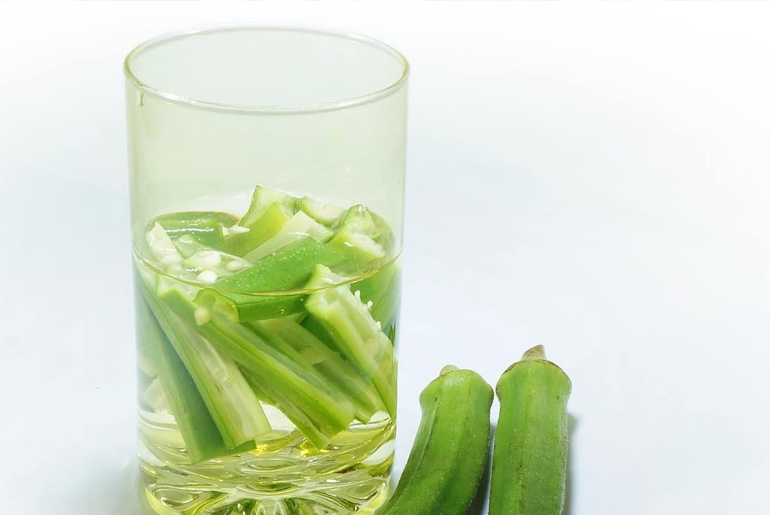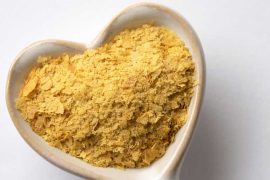Okra water has recently gained popularity on social media, with influencers touting its numerous health benefits, including improved blood sugar levels, digestion, and sexual function. Some even suggest it may help pregnant individuals have an easier vaginal delivery, though not for inducing labor. While okra itself is known to offer certain health benefits, there is currently no scientific evidence supporting these claims about okra water. Let’s explore the health claims associated with okra water and its potential for addressing specific health conditions.
Okra water:
Okra water is made by slicing fresh or frozen okra pods, submerging them in water, and allowing them to steep in the fridge for several hours. After straining, the resulting liquid is known as okra water, which has a distinct texture due to the release of mucilage from the okra seeds. This mucilage, a gooey substance composed of polysaccharides (carbohydrates), proteins, and minerals, gives okra water a thicker, sometimes slimy consistency. According to a gut health dietitian, this texture is a result of the fiber and nutrients released during the soaking process.
Is Okra Water Beneficial for Your Health?
Okra water, made by steeping okra in water, is believed to offer several health benefits, although many of the claims lack scientific backing. Here is a detailed breakdown of the potential benefits and the scientific perspective:
- Improves Digestive Health: Okra is a great source of both insoluble and soluble fiber, which offers numerous digestive health benefits. Fiber helps support a healthy gut microbiome, promotes regular bowel movements by moving stool through the intestines, and bulks up stool, making it easier to pass. It also softens stool, which can reduce the likelihood of hemorrhoids, and may lower the risk of diverticulosis, a condition involving small pouches in the colon that can become inflamed. However, Kaytee Hadley points out that it’s uncertain whether okra water provides the same digestive benefits as eating the vegetable itself.
- Promotes Heart Health: The soluble fiber in okra can help lower cholesterol levels by binding to cholesterol and helping expel it from the body, thus potentially preventing heart disease. While fiber’s role in heart health is well-established, it’s uncertain how much fiber remains in okra water after steeping. Therefore, its heart-health benefits are speculative.
- Detoxes the Body: Okra water is often claimed to detox the body, as it contains both water and fiber, which are key components of the body’s natural detox processes. Drinking water helps the body eliminate waste and toxins through the kidneys, sweat, and lymphatic system, while fiber aids in removing toxins via stool. However, a gut health dietitian, emphasizes that okra water is not a miracle detox food. Instead, you can stay hydrated with plain water and consume a variety of fiber-rich foods such as fruits, vegetables, whole grains, legumes, nuts, and seeds for detoxification.
- Supports Weight Goals: The fiber in okra may contribute to feelings of fullness, which could help with weight management. Additionally, replacing sugary drinks with plain water might promote weight loss. However, no research has been conducted specifically on okra water and weight loss, so the benefits remain theoretical.
- Regulates Blood Sugar: Research indicates that fiber helps manage blood sugar levels. Some early studies suggest that compounds in okra, such as polysaccharides and antioxidants in its mucilage, might help regulate blood sugar. However, these studies have been conducted on animals and in lab settings, so the effects on humans remain unclear.
- Supports Sexual Health: Social media claims that okra water increases vaginal lubrication due to its mucus-like texture have not been substantiated by scientific evidence. There is currently no proof that okra water affects sexual health or vaginal moisture.
Okra Nutritional Facts:
Okra is a good source of fiber, vitamins C and K, manganese, magnesium, and folate. A cup of raw okra provides 2 grams of protein, 7 grams of carbohydrates, and 3 grams of fiber. However, it’s unknown whether the nutrients from the vegetable are adequately transferred to the water when steeped.
Who Should Not Drink Okra Water:
Okra water is generally safe but may cause bloating or stomach upset, especially for those unaccustomed to a high-fiber diet. If any discomfort occurs, it’s recommended to reduce or discontinue consumption. Although rare, allergies to okra can also occur, and people with okra allergies should avoid drinking okra water.
Okra Water and Pregnancy:
Although okra is a fiber- and folate-rich vegetable beneficial during pregnancy, there is no scientific evidence to suggest that okra water has any effect on childbirth. Claims that it can help with vaginal delivery by creating a “slippery” environment remain unsubstantiated.
How to Drink Okra Water:
Okra water is typically consumed by steeping okra in water, with around 8 oz recommended daily. Some people may find the texture or taste unpleasant due to its sliminess, but it can be modified by adding coconut water, fruit, spices, or even blending it to smooth out the texture.
While okra offers health benefits, including fiber, vitamins, and antioxidants, it is unclear whether these nutrients transfer effectively into okra water. More research is needed to understand the potential health benefits of okra water, as the current claims are not backed by sufficient scientific evidence. It can be part of a balanced diet, but it should not be relied upon as a “miracle” health remedy.
Disclaimer:
The information contained in this article is for educational and informational purposes only and is not intended as a health advice. We would ask you to consult a qualified professional or medical expert to gain additional knowledge before you choose to consume any product or perform any exercise.







